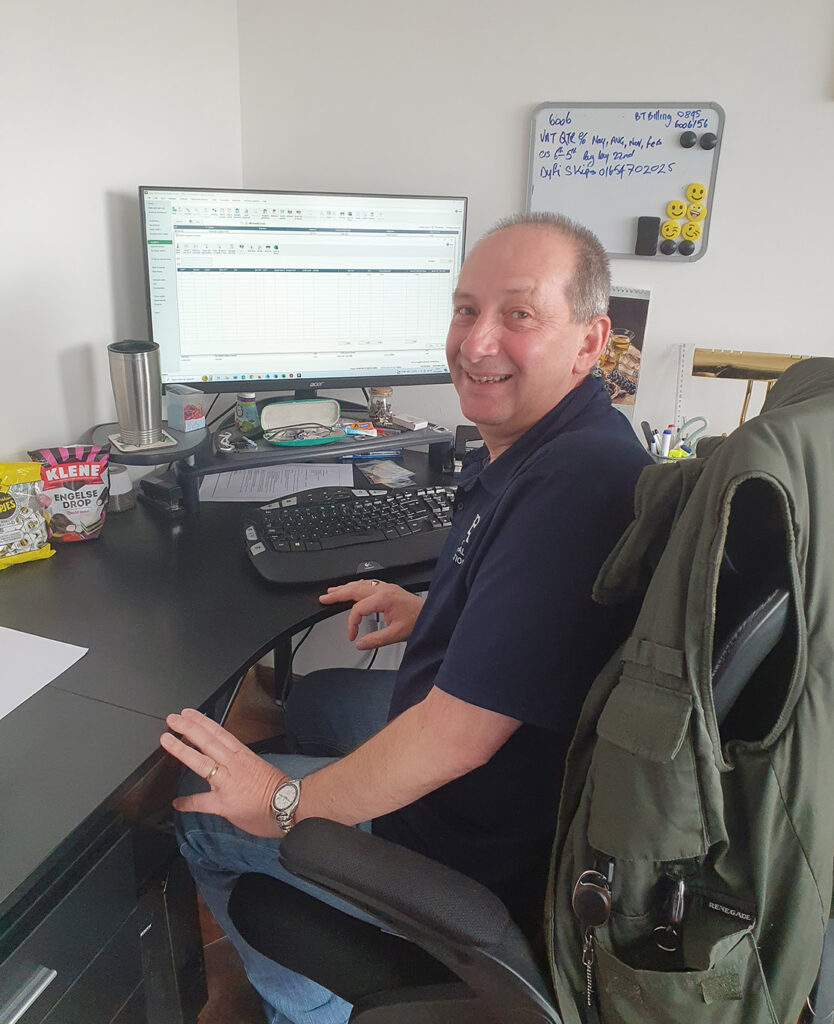A Day in the Life of Simon Hughes – BHR’s Accounts and Office Guru
Let’s Get the Day Started
As excellent as BHR Commercial Construction Ltd are at building and fitting out retail, leisure, and business premises, it falls apart without excellent administration.
That’s the realm of Simon Hughes, and this is his ‘behind the scenes’ profile.

Whilst Dirk, Dan and Jordan are almost always out and about on project sites, Simon works from his home, keeping all the paperwork tightly controlled.
“It’s not a spare room,” he says of his work space. “It’s very definitely an office. There’s no bed or sofa, nothing that distracts me from my focus on the job.”
He believes strongly in creating a divide between ‘work’ and ‘home’, so dresses in his BHR polo shirt, and shows up at 8am.
His first job is to turn on the computer and check email – what’s arrived overnight? Is there anything that needs an urgent response? He replies to those that need a response, and downloads any statements, invoices or attachments that need filing.
On average it’ll take him an hour to get through the emails. Then anything financial gets entered onto Sage and he’ll process the previous days banking, checking what’s come in or gone out.
Paperwork and Payments
Most of the morning is spent dealing with any paperwork that’s come in, getting everything up to date, and then making payment decisions alongside Dirk.
BHR are members of the Prompt Payment Code, which involves a commitment to paying suppliers within the terms of their agreement. That’s mostly 30 days. Some large suppliers have 60 day terms, but Simon will often pay them early.
There are times when ‘average’ doesn’t cut it of course – end of month, end of quarter and end of year all bring additional work with them.
At the end of each month there’s payroll to take care of, invoices from sub-contractors and plant hire companies to pay, and reports to complete.

There will also be a CIS return to complete. That’s the Construction Industry Scheme Building Tax, which requires main construction contractors to deduct tax from their subcontractors. There are different levels of ’tax treatment’, and it’s designed to ensure sub-contractors get their tax paid. If it’s ‘over-collected’ they can claim it back at the end of the year.
This places a lot of responsibility on BHR – whenever they take on a new contractor, Simon needs to visit the HMRC site to ascertain what their specific tax status is, and then apply it each month. With different contractors needing different deductions, the return takes a while to pull together.
Other ‘pinch points’ in Simon’s schedule include the end of the VAT quarter, and the small matter of the year end.
But going back to a regular day, all this administration is what usually makes up Simons morning.
Time for Lunch?
Most days he’ll make time for a lunch break. This sees him heading out of the office and down to the kitchen where he’s ‘off duty’. He’ll eat away from his desk, except on those days where the work has piled on. That’s kept to a minimum though, as it’s good for him to shake off all the numbers running through his head ready for the afternoon.
After the break he’s back to the office and in work mode again, and starts on the project reports.
Keeping Projects On Track
For each project BHR are working on, Simon compiles a report, which he updates daily with the latest incoming data. This includes invoices received, purchase requests from the site, and info from any conversations he’s had with the client, BHR site manager, or other people involved in the day-to-day operations.
And each day he takes any new information and updates the report accordingly.
That means he has his finger in the pulse of every single project, and he’s completely up to date with the financial position of each of them in real time.
He also generates CVR/surveyor reports, which show more than just the outline of the finances. They hold far more detail, so he’s creating information that shows exactly how the project reality is lining up against the projected costs and operation.
The data he generates with the CVR is granular enough that he can see clearly if they’ve had any unanticipated costs or savings, and where they’ve arisen. This is a goldmine when it comes to future projects, as it shows where they need to increase their quotations, and also where they can make savings.
This state of continual update and improvement means clients are guaranteed a great price, and BHR are protected against any unexpected losses, when applied to future projects.
Tendering for New Work

When it comes to procurement of new tenders, Simon’s role is critical. For smaller projects, it’s him who issues quotations to potential clients, based on Dirk’s pricing.
Quotes on large-scale projects are calculated by BHR’s quantity surveyor. He extracts details from the client’s brief to produce a formal quotation which is then run past Dirk before presenting to the client. During this process, Simon will send out tender enquiries to potential subcontractors to ensure that the costs do not outstrip the quoted price.
Part of the information included in the report covers green eco codes and standards, especially with new builds. Legislation is in a state of constant change and updating, and these all need to be included when they put out to tender. Both the QS and Simon watch out for notifications about this.
And if the tender is successful? Simon draws up the contracts and handles the administration. He takes care of procurement, purchase orders, and written instructions for sub-contractors.
With all this detail to consider it’s no surprise that tendering takes more time than the bookkeeping.
Fresh Skills
Simon knows bookkeeping is where his core knowledge lies. It’s second nature to him now, and he gets it done efficiently and accurately.
Tendering, and the details surrounding that are still part of his learning curve – but that gives him the opportunity to extend his knowledge and experience, which he loves.
Simon wants to develop an expertise in everything admin for the construction industry. What he’s less familiar with he reads up on in order to have the fullest grasp on the whole of each project.
His studies have included quantity surveying – not with any intention of becoming a surveyor, but in order to understand much more about that side of the job. Foundations, clearance, digging – all these were mysteries to Simon until he began working with Dirk. Now he’s becoming a dab hand at understanding the costs associated with such work.
His years of financial experience, combined with the decades in commercial construction that Dirk and Dan bring to the party, makes for a powerful unit. BHR provide accurate, on-target quotations – quotes that they don’t need to inflate later in the project because they’re based on great data and knowledge.
Constant Communication
Is Simon’s day just all admin? Hardly! He fields a good number of fresh emails and phone calls throughout the day. He’ll be on the phone to Managing Director Dirk a few times, and expects to speak to the site managers on each project once or twice a day to discuss progress and requirements.
That’s aside from calls from suppliers and contractors – it’s a busy work day, whenever in the calendar it falls.
Wrapping Up
Simon tries to keep to his 8-5 schedule, though there are times when he needs to work a bit later. Sometimes he’ll need to grab a sandwich to eat at his desk at lunchtime, especially when there are more than a couple of projects running concurrently. And once in a while he’ll give up part of his evening to make sure everyone has what they need ready for the next day.
With everything taken care of, he clocks off. In line with his ‘keep the work in the office’ policy, Simon will close the office door, change his shirt, and relax in front of the telly for a while. When he has a bit more time free he loves fishing, which lets him completely disengage from the construction world.
Simon’s primary talents and contribution include running a hugely organised system. A system that delivers all the communication, information and reporting needed by the team. That way he keeps everyone abreast of the progress, challenges and triumphs BHR Commercial Construction Ltd enjoys during the year.
Back to Insights